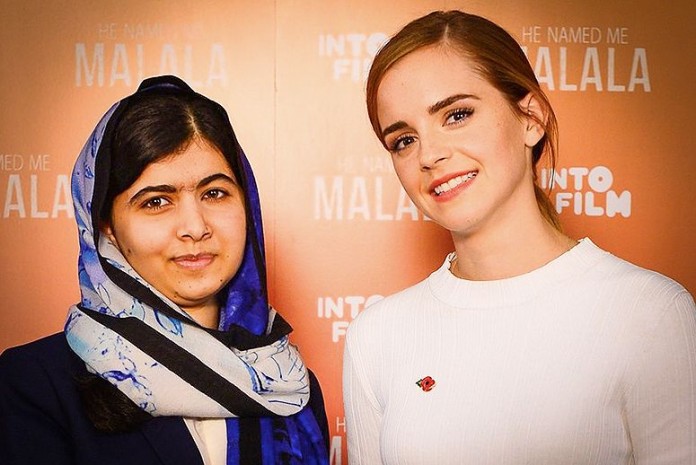By Laura Durnell

In 1997 she entered the world.
In 2009 she began writing an anonymous blog advocating education as a right for all children.
In 2011 her home country awarded her with its First National Peace Prize.
In 2012 when she was 15, she was shot on her bus ride home from school simply because of her beliefs.
In 2013 she co-founded a foundation to increase awareness for the importance of girls’ education.
In 2014 at the age of 17, she became the youngest recipient of the Nobel Peace Prize.
In 2015 she called herself a feminist as well as an education activist.
Her name is Malala Yousafzai, and she is a millennial.
In May of 2013, Time magazine devoted its cover story to the millennial generation entitled The Me, Me, Me Generation. It listed some attributes that I am sure you have heard and read about: spoiled, disrespectful, entitled, impatient, shallow, lazy, aliterate, narcissistic, sheltered, arrogant.
I have taught first year writing far longer than I would like to admit. During this time, I have educated students ranging from the Greatest Generation to those still in high school working toward advanced college credit. While I do admit I have taught my share of stereotypical millennials, I am please to say that stereotype has not been the norm. I also know the stereotype is not unique to them. In Ancient Greece, Socrates said, “The children now love luxury. They have bad manners, contempt for authority, they show disrespect for elders and love chatter in the place of exercise.”
Every generation has faced some sort of criticism, and people have declared that the current generation coming of age will be the end of civilization. However, that negates the accomplishments and power each generation achieves. With this being women’s history month, I want to address two famous millennial women as well as those under the radar who take leadership roles and challenge the status quo.
In addition to the now eighteen-year-old Malala Yousafzai, twenty-five-year-old actress Emma Watson has emerged as a gender activist. In 2014 she became the United Nations Women Global Goodwill Ambassador and heads the HeForShe Campaign. With her hair pulled back and wearing an elegant white dress secured with a silver belt, the HeForShe Campaign button secured to her left lapel, Watson looked more confident and determined than admittedly nervous when she delivered her amazing 2014 speech to the UN. That speech was broadcasted by CNN and later went viral. I have even shown it in my WRD 104 class as an example of rhetoric, language, audience, cited evidence, and argumentation.
Since her speech, Watson continues to advocate gender equality for men and women. Better yet, she extends a hand to men to work as allies in breaking gender expectations. In person and online, she works to raise awareness and opportunities for equal pay, women’s education, women’s health, and women’s political participation and contribution. In February, she told Paper magazine, where she was featured alongside feminist and writing legend bell hooks, she planned to take a year off from acting to concentrate on feminism, activism, and personal development.
Watson is also the person who led Yousafzai to call herself a feminist. Before the premiere of her documentary He Named Me Malala, Watson interviewed Yousafzai who told her:
It has been a tricky word. When I heard it the first time, I heard some negative responses and some positive ones. I hesitated in saying am I feminist or not?
Then after hearing your speech I decided there’s no way and there’s nothing wrong by calling yourself a feminist. So I’m a feminist, and we all should be a feminist because feminism is another word for equality.
Out of the spotlight, I see the same drive and confidence in the writing and research done by several of my female millennial students. This quarter alone, several are writing their argumentative-research essays on contemporary topics relevant to women. One student argues how even in 2016, “toxic masculinity” continues to prevent women from advancing in basic human rights while stripping their existing rights. Another student argues how school dress codes unfairly focus on female students and even “slut shames” them, which in the end advances the rape culture. And another student argues that the Texas law “protecting” women’s health, which the United States Supreme Court just finished hearing arguments for and against, in reality damages women’s health by limiting and ultimately shutting off access to abortion providers and services.
Last year one of my Muslim students in my Erica Jong focal point seminar focused her final essay on Islamic feminism and argued that Islamic feminism provides women more rights and dignity than Western white feminism. And several years before my Erica Jong Focal Point liberal arts seminar, one of my female African American students argued that black women served as the true power behind the abolition of slavery and the Civil Rights Movement in the mid-twentieth century.
As the General Election arrives this November, the one demographic that should not be dismissed are millennials—especially millennial women. They are the fourth wave of feminism. Even though I am a cynical and snarky Gen Xer from the third wave, millennial women make me hopeful for the future of not only women but the world.
Laura Durnell is a member of DWN’s Marketing and Communication team and a part-time faculty member in the Department of Writing, Rhetoric, and Discourse at DePaul University. Along with first year writing, she also teaches a focal point on Anne Sexton and will teach another one in the spring entitled “Women’s Confessions.” She tutors at Wilbur Wright College in addition to her teaching at DePaul and has recently published an essay in Trivia: Voices of Feminism entitled “The Social, Cultural, and Political Necessity of Anne Sexton.”